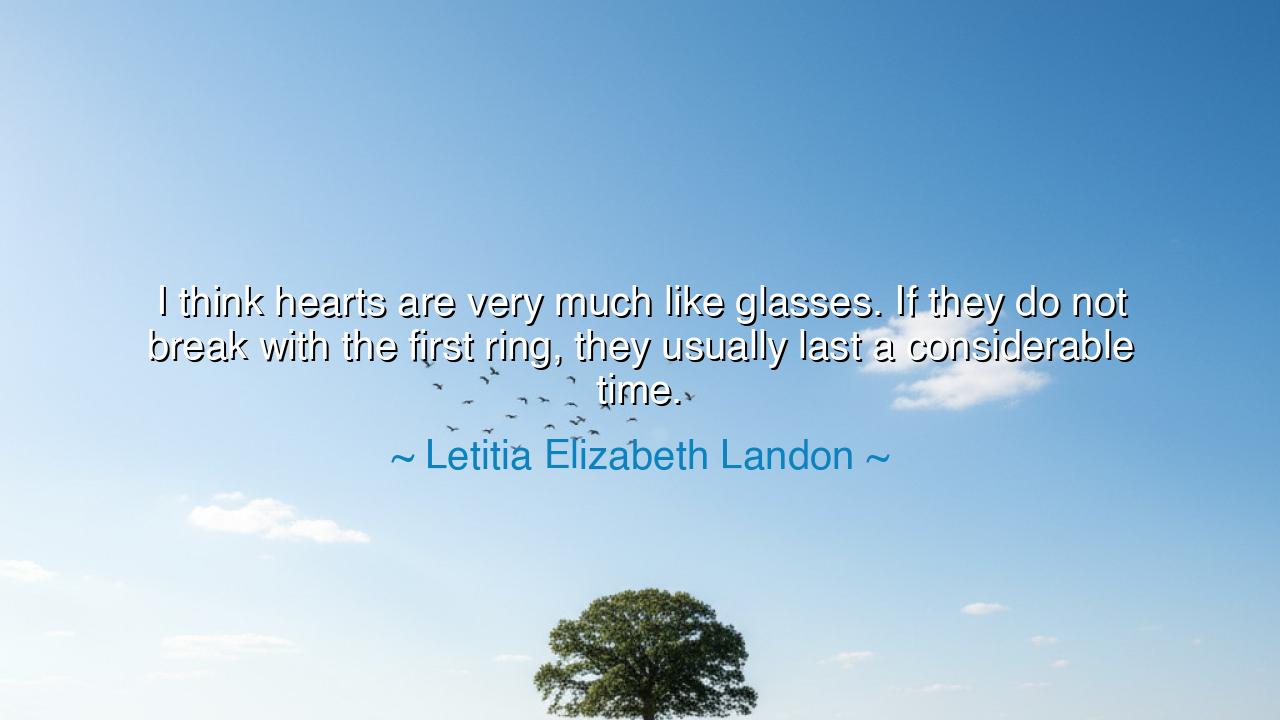
I think hearts are very much like glasses. If they do not break
I think hearts are very much like glasses. If they do not break with the first ring, they usually last a considerable time.






In the words of Letitia Elizabeth Landon, poetess of the Romantic age, we find a metaphor both delicate and enduring: “I think hearts are very much like glasses. If they do not break with the first ring, they usually last a considerable time.” Here the heart, seat of our affections, is likened to glass—fragile, shimmering, and capable of both beauty and fracture. Landon’s observation is not merely about love, but about the nature of resilience itself. She teaches us that while the first wounds of the heart may be most perilous, a heart that survives its earliest trials often gains the strength to endure much more.
At the center of this saying lies the truth of first sorrows. The first heartbreak, the first betrayal, the first deep wound of love or loss, strikes the heart when it is untested, when innocence still wraps it like thin glass untempered by fire. Many are shattered at that first blow, left hesitant to love or trust again. Yet for those who endure—who survive the first crack without breaking—the heart becomes stronger, more flexible, tempered like glass that has been tested by ringing blows. Such hearts do not shatter easily thereafter.
The ancients knew well the danger of first trials. The Greek tragedians often depicted youth undone by their first encounter with fate: think of Phaedra, consumed by forbidden love, or Narcissus, broken by his first passion for his own reflection. Their stories teach that untested hearts are fragile indeed. Yet the ancients also told of those who endured: Odysseus, who lost companions, kingdom, and years, but whose heart grew resilient through suffering, enabling him to survive storms that would have undone lesser men. Landon’s metaphor echoes this eternal truth—that endurance is born from surviving the first, hardest blows.
History too gives us examples of this truth. Consider Abraham Lincoln, who in his youth endured crushing sorrows—the death of his first love, Ann Rutledge, and later the loss of his young children. His heart could have shattered, leaving him a broken man. Instead, though scarred, he endured, and those very sorrows tempered him into the compassionate and steadfast leader who would bear the weight of a nation at war. His heart, tested early, became one that lasted “a considerable time.”
There is also tenderness in Landon’s words, for she speaks not only of survival but of the fragility of love. Just as glass, though enduring, must still be handled with care, so must hearts—even strong ones—be treated gently. A heart that has survived its first breaking may last, but it still bears marks, still carries memories of its fragility. To love another is therefore to treat them as one would a treasured vessel—precious, delicate, and deserving of reverence.
The lesson for us is twofold: first, that when the heart breaks for the first time, we must not despair, for survival is possible; second, that once we have endured, we gain resilience that allows us to live with greater depth and courage. Do not fear the first shattering blow, for it is also the forge of strength. And do not take lightly the hearts of others, for even when they appear strong, they are still glass—still capable of breaking.
Practically, this means cultivating compassion both for ourselves and for others. If you are enduring your first heartbreak, know that time will temper you, and survival will make you stronger. If you have endured much already, do not dismiss the pain of another who faces their first sorrow—guide them, comfort them, remind them that the heart can last if it does not break outright. And above all, treat every heart as fragile, offering patience, kindness, and gentleness in your words and deeds.
So let us remember Landon’s wisdom: the heart is like glass. Fragile at first, but enduring if it survives the first ring. To endure is to grow strong, and to treat others’ hearts with care is to honor the sacredness of love itself. For though hearts may break, those that endure become vessels of great strength, lasting long, shining bright, and carrying the wisdom of all they have survived.






AAdministratorAdministrator
Welcome, honored guests. Please leave a comment, we will respond soon